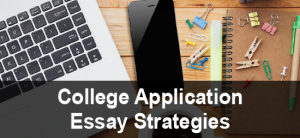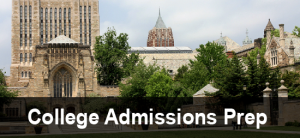The Common App essay topic (2020-2021) that asks you to “Describe a problem you’ve solved or a problem you’d like to solve” can be an excellent option.
The full prompt is as follows:
“Describe a problem you’ve solved or a problem you’d like to solve. It can be an intellectual challenge, a research query, an ethical dilemma—anything that is of personal importance, no matter the scale. Explain its significance to you and what steps you took or could be taken to identify a solution.”
Why Are Admissions Officers Interested in “Problem You’ve Solved” Common App Essays?
Want to write an amazing “problem you’ve solved or a problem you’d like to solve” essay?
The actual problem that you write about solving or wanting to solve is, of course, a key part of your essay.
However, it’s not the only thing that matters.
Too many students don’t realize the underlying reasons why admissions officers find it useful to read Common App essays about problem-solving experiences. That’s why I’m sharing them with you in this article.
As you’re reading these reasons, think about these two things:
- Do you have problem-solving experiences that demonstrate you possess the qualities that admissions officers are looking for in such essays?
- What kind of anecdotes could you create to show you have these qualities?
#1 When reading a “problem you’ve solved” essay, admissions officers are looking to learn about how you:
- Grapple with difficulties and perplexing situations
- Deal with questions that aren’t immediately answerable or resolved
In college, you’re going to face lots of challenges. You’ll work on complex intellectual problems that might have no one right answer. Projects will cause you to hit the limits of what you already know and compel you to enter new, uncertain epistemological territory to figure things out.
Set up the problem in your essay in a way that will show readers the complexity of the situation and that there was no easy solution.
#2 Colleges are looking for students who know how to:
- Assess problems
- Think creatively about problems
- Explore multiple viewpoints on problems
- Collaborate with others to work through problems
- Devise focused but flexible action plans to solve problems
- Persist when they face problem-solving challenges
The first reason focused on hitting your limits. This reason focuses more specifically on the process of finding solutions, creating plans, and taking action.
Many students mistakenly believe that what admissions officers are really looking for in your Common App essay is your groundbreaking solution or the “high impact” of a project.
You definitely need to include your solution, but you also need to REVEAL YOUR PROCESS of assessing the problem and identifying a solution through vivid anecdotes.
The actual problem itself is often less important than your PROCESS of grappling with it, figuring out how to solve it, and trying to implement the solution.
#3 Admissions teams are searching for evidence of your intellectual vitality and your “reserve power to do more.”
As the Yale admissions team points out, the deans are looking for students who possess the “desire and ability to stretch [their] limits.” A former Yale president remarked:
“I am inclined to believe that the person who gives every ounce to do something superbly has an advantage over the person whose capacities may be great but who seems to have no desire to stretch them to their limit.”
The Harvard admissions team notes that they’re evaluating your “growth and potential” and looking to answer questions such as:
“Do you have initiative? Are you a self-starter?”
In some ways, this reason isn’t all that different from the first two. However, intellectual vitality and academic promise are two of the most significant qualities that Ivy League and other highly competitive schools are looking for in applicants, so I wanted to underscore them.
A Common App essay on a “problem you’ve solved or a problem you would like to solve” can reveal your intellectual vitality and your unquenchable desire to stretch and grow. It can show that you’re not the kind of person who just points out and complains about problems. You’re the kind of person who sees a problem and focuses on trying to figure out solutions.
What to Avoid and What to Do in the “Problem” Common App Essay
When writing a college application essay, students often experience an urge to come up with a tidy conclusion. You want to say something like, “Once I figured out how to solve the problem, everything was clear and my life totally changed.”
I get it. You want to impress colleges.
However, overly simplistic conclusions aren’t necessary and don’t appeal to admissions officers. You’re entering the next phase of your life, and life is getting more complex. Solutions are often provisional and don’t necessarily work in all situations.
It can be more impressive to show how you’re engaged in an ongoing process of coping, refining, and rethinking. This type of strategy is very powerful—more powerful than the magical solution type of conclusion.
As William James (a famous American philosopher and founder of Pragmatism) points out:
“The world of concrete personal experiences. . .is multitudinous beyond imagination, tangled, muddy, painful and perplexed.”
College admissions officers want to know: Can you handle it?
As I mentioned earlier, the actual problem you focus on in your application essay might not be as important as the way you describe your process of thinking about and handling it. In college, you might not come across the same problem, but you’re going to come across other problems, and admissions officers are curious about your process of identifying, thinking through, and solving problems. In other words, what might be most valuable to admissions officers is your insight and underlying process, not the specific problem itself.
Many of the Common App essay topics don’t explicitly state that you should share your process, but the “problem” essay prompt does. You’re asked to share “what steps you took or could be taken to identify a solution.” You definitely want to make sure to share your process.
Students often shy away from the process because they don’t think it’s dramatic or exciting enough.
They’re wrong.
Click here to read “Techniques Used in the Best College Application Essays,” where I talk about the importance of process and the structure of essays.
Potential BIG Problem with Choosing this Common App Essay Prompt
It’s important to develop a comprehensive overview of all the essays that are going to make up your college application package because you want to ensure that you are providing admissions officers with a vivid, compelling image of your intellectual interests, extracurricular passions and experiences, habits of mind, and character.
I raise this point because in this particular Common Application essay topic you are told that your “problem” essay can “be an intellectual challenge, a research query, an ethical dilemma—anything that is of personal importance, no matter the scale.”
You don’t have to write about something intellectual, research oriented, or ethical. You can write about any kind of problem.
If you want to write about an “intellectual challenge,” “research query,” or other academic project in your Common Application essay, you need to figure out if there’s going to be too much overlap with any supplemental essays you have to write.
For instance, if you’re applying to the University of Pennsylvania, you will be asked to write a response to this question:
“How will you explore your intellectual and academic interests at the University of Pennsylvania? Please answer this question given the specific undergraduate school to which you are applying.”
It could be that writing about a specific problem you encountered in one of your research projects is the perfect complement to what you discuss in your Penn supplement. Your Common App “problem” essay could take admissions officers deep into a very specific aspect of a research experience while also shedding light on more personal qualities. Your Penn supplement could add depth and range to the super specific thing you address in your Common App essay. However, it could be that there’s too much overlap and not enough range. So you have to map things out and think critically.
Engineering programs are very interested in your problem-solving abilities. In fact, you might even be asked to write supplemental essays about problem solving. For instance, if you’re applying to Cornell, you’ll need to respond to this supplemental essay topic:
“Cornell Engineering celebrates innovative problem solving that helps people, communities…the world. Consider your ideas and aspirations and describe how a Cornell Engineering education would allow you to leverage technological problem-solving to improve the world we live in.”
So should you have two essays that focus on problem solving? There’s no one right answer, but it’s a question you need to consider. I do not advise writing two different Common Application essays. Click here to read “How to Write a Great Cornell Supplement.”
If you are applying to engineering programs that do not explicitly ask you to write about problem solving, it might be a good idea to consider the “problem you’d like to solve” essay. Click here to read “How to Successfully Apply to Engineering Programs.” Scroll down in the article to learn more about the emphasis on problem solving.
One of my former students wrote a great Common Application essay on solving problems that came up when he was trying to build his own snowplow to attach to his tractor. Admissions officers not only learned about his process of developing, testing out, and modifying the plow. They also learned about his small mowing business and family background.
Video Review
Here’s my YouTube video on “How to Write Your Common App Essay on 1A Problem You’ve Solved or Would Like to Solve'”:
WAYS TO WORK WITH DR. BERNSTEIN!
Click here to learn how to schedule a private consultation with Dr. Bernstein.
Click here to learn more about Dr. Bernstein’s ongoing private college preparation and college admissions support.
Click here to learn about the online Get Yourself Into College® program.
Blog post image used: ©DBBPhotography/bigstock.com



